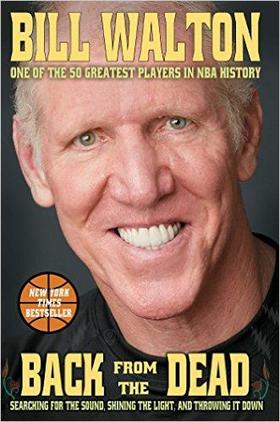NBA’s Bill Walton: “Back from the Dead” | Book Review
For teenager Bill Walton, the music (The Grateful Dead, Dylan, Neil Young, etc.) he was hearing and basketball he was playing became one. He explains, “. . . guys start playing and figuring things out . . . It all rolls into one. A wonderful thing about basketball is that on every one of your trips up or down the floor you have an opportunity to make a positive contribution to the outcome of the game. It’s the same with music. If you’re going to win 88 games in a row, as we did at UCLA, or 142 games in a row, as we did spanning (San Diego’s) Helix (High School) and UCLA, or you’re going to be up onstage to bring euphoria to millions of people over the course of fifty years, you have to do basically the same thing . . . master your own skills, anticipate all the possible movements of the other players, and know how to react to everything, especially when things go wrong or off the tracks.” These words express a major theme of Walton’s book, Back from the Dead—a memoir of becoming a success as a player and broadcaster of one of America’s greatest pastimes: basketball. Throughout this life story, however, he relates the challenges of enduring injury setbacks and other life obstacles.
“Climbing the mountain” is the mantra of this self-described deadhead, an athlete who endured 37 orthopedic surgeries and rehabilitation periods. The event climax was a collapsed spine that would lead to losing his job as an ESPN broadcaster. Woven within the spectacular college and professional basketball seasons are tales of agonizing pain and emotional setbacks that take the reader on a roller coaster ride. Contrastingly, the book is full of warm expressions of gratitude for the coaches who recognized his potential and the great players who really make the college and pro game what it is. Tributes to Portland teammate and enforcer Maurice Lucas (“What seems to be the problem here?”) stand out.
Walton won NBA championships with two of his three professional teams—the Portland Trailblazers and Boston Celtics. To repeat as champions, the Blazers asked Walton to play with pain and accept injections to a foot that was determined to be broken—Walton was sidelined and requested a trade. With his next team, the San Diego Clippers, Walton was embroiled in lawsuits seeking damages for his inability to play and fulfill contracts due to injuries. Walton actually played in less than 40% of the games for which he was under contract during his NBA career. Finishing his career, he played a major role with the Boston Celtics, winning the NBA Sixth Man of the Year Award. The pro game is where the money and fame are, but as a collegian Walton was a three-time NCAA Player of the Year and Academic All-American. He loved going to class and being on campus, a six foot ten inch activist with a political conscience.
In high school, Walton knew who he wanted to play for—UCLA and John Wooden. Coach Wooden’s game included features to become legendary: set plays were never used and calling a timeout (that would allow the opposing team to recover) was not allowed. The 2-2-1 defense was pressing the full court with Walton defending the basket; on offense, the formation was similar and Walton played the baseline. He was a voracious rebounder, shot blocker, and outlet passer with incredible individual statistics; but, for the big redhead and Coach Wooden it was all about team play and chemistry. Walton will scoff at today’s player dribbling pointlessly through his legs above the 3-point arc. Bruin Tommy Curtis was the only UCLA teammate who frustrated him with selfish play. Walton describes the contributions of teammates Henry Bibby, Jamaal Wilkes, Greg Lee, Larry Farmer, Swen Nater, and Larry Hollyfield as necessary for the run of three NCAA championships in Walton’s three seasons of college eligibility.
There are no proclamations of greatest all-time center in this book. Walton praises the contributions of Chamberlain, Russell, Abdul-Jabbar; and he also belongs in the discussion for his way of starting the fast break with a shot block or rebound and quick outlet pass. Read this inspiring book to improve your own transition game.
Walton, Bill. Back From the Dead. Simon & Schuster: New York. 2016.

9(MDA3NDU1Nzc2MDEzMDUxMzY3MzAwNWEzYQ004))
Become a Member
Join the growing family of people who believe that music is essential to our community. Your donation supports the work we do, the programs you count on, and the events you enjoy.
Download the App
Download KUVO's FREE app today! The KUVO Public Radio App allows you to take KUVO's music and news with you anywhere, anytime!
